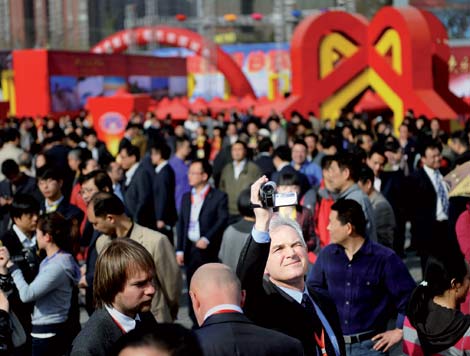|
 |
|
Foreigners at the investment and trade fair for cooperation between eastern and western China in Xi'an, Shaanxi province on April 5. Business representatives from 67 countries and regions attended the fair to seek trade and investment opportunities. [Photo / China Daily] |
Despite the risk of further deceleration, China's economy is still growing faster than that of many other nations. To help ensure that will continue, the country has pledged to encourage domestic consumption in the years ahead. China receives the second-largest amount of foreign direct investment, just behind the United States, and the largest amount among developing economies.
Since November, the amount of foreign direct investment in China has fallen for sixth consecutive months. In April, the figure decreased by 0.74 percent year-on-year.
"The Chinese government doesn't need to worry about the drop. This cannot last long, and China is still very attractive," said Gerard Worms, chairman of the International Chamber of Commerce.
"China will continue to be attractive for years, even as capital shifts to the west from the rich coastal region," said Huo Jianguo, director of the Chinese Academy of International Trade and Economic Cooperation.
"I have to say that cities in the west have a huge potential to absorb foreign direct investment and that cities there will drive China's future economy."
The westward movement of international companies such as Samsung and HP will open opportunities in the region for other companies, which are likely to follow closely on the heels of the pioneers.
That will be the beginning of what Li Zhijun, director of Xi'an Bureau of Investment Promotion, calls the "ripple effect".
"The ripple effect from Samsung will be huge," and will lead to "slews of other foreign companies piling into Shaanxi and thus driving the local economy".
Since Samsung announced its decision early this year, the Shaanxi government has welcomed a number of foreign companies and visitors that are looking to make investments. Take Messer Group GmbH, a German company that manufactures and supplies various types of gas. It had planned to set up a small branch in Xi'an last year but later decided to open a fully fledged factory there.
Westward Ho!
The US company Applied Materials Inc, a producer of semiconductor equipment, is one of the first batch of foreign companies that decided to establish factories in China's west.
In 2003 - three years after the central government introduced its western development policy - the company decided to establish a global research and development center in Xi'an. The company has so far invested $255 million in the center.
"Xi'an has a rich reserve of talented workers thanks to its large number of higher learning institutes," said Zou Gang, general manager of Applied Materials Xi'an. "Also the government's policies are preferential."
Since the western region's economy is only in the early stages of opening up, "many of our foreign staff members who are working here said they don't find a great number of conveniences in their daily lives - on matters ranging from where they should eat and live to the sort of transport they can take," Zou said.
"Fortunately, the local government is cooperative, flexible and responsive."
Li Qian from Chongqing said the government should place a priority on having "stable and continuous policies, transparent rules and regulations and convenient access to various types of information".
As the country's west make preparations for its own economic rise, it all the while faces more intense competition from rival cities in central China that are also intent on attracting foreign companies.
Wuhan, in Hubei province; Zhengzhou, in Henan province; Wuhu, in Anhui province, and other cities are all welcoming capital and factories from the east and abroad. Two of their most recent successes came in attracting Unilever, a large maker of consumer products, and Continental AG, a tire maker.
Unilever, headquartered in London and Rotterdam, has moved seven factories to Hefei, capital of Anhui province, from Shanghai and plans to make the city its chief center for global manufacturing.
Besides Unilever, at least 25 other of the global top 500 companies have factories in Hefei. They include ABB Ltd, which provides engineering and other services, and the Japanese conglomerate Hitachi Ltd.
Ministry of Commerce data suggest that the amount of foreign direct investment entering China's central region in the first four months of the year increased by 12.6 percent year-on-year. The comparable figure for the entire country, meanwhile, decreased by 2.38 percent in the same period and that for the western region decreased by 15.2 percent.
"Judged by its preferential policies and infrastructure, the central region is less attractive than the western region," Huo said.
Still, western cities should work to add to their stock of "transportation, talent, service" and other resources.
